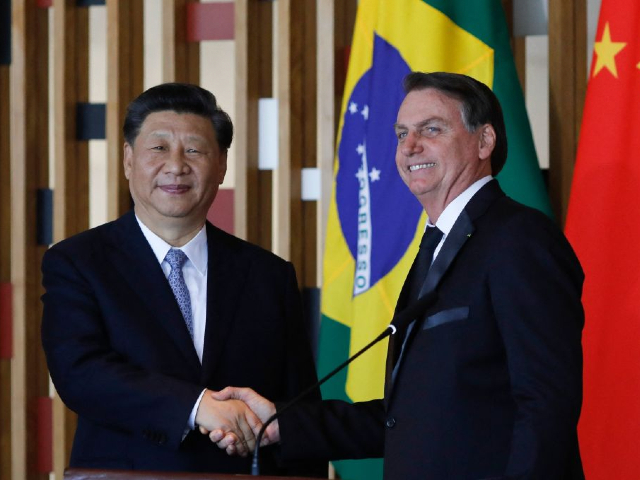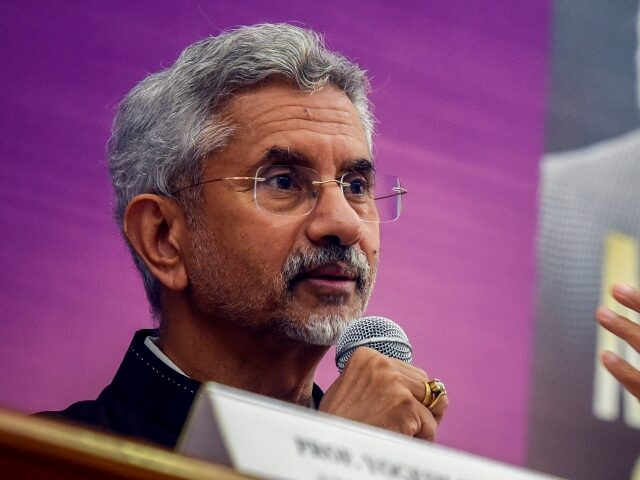To be a “leading power,” India is going to have to become significantly more influential in Latin America, Indian External Affairs Minister S. Jaishankar asserted in a speech on Wednesday in which he revealed New Delhi’s plans to greatly enhance commercial and geopolitical ties to the region.
Growing Indian influence in Latin America would be a direct challenge to communist China, which has invested heavily in making Latin America’s largest economies dependent on its manufacturing and agricultural imports and in propping up the region’s bloodiest dictatorships, all of which are ideologically aligned with Beijing. The Chinese Communist Party has helped both the dictatorships of Venezuela and Cuba avoid total economic collapse, become Brazil’s largest trade partner (even under self-proclaimed conservative former President Jair Bolsonaro), and made significant moves towards dominating Chile’s lucrative mineral industry.
The Indian government had long expressed little interest in becoming a major influence in the Western Hemisphere prior to Prime Minister Narendra Modi’s term in office. In the last two years, however, Jaishankar has increasingly described Latin America as important to India’s interests. Jaishankar also visited Brazil, Argentina, and Paraguay last year, the first time an Indian external affairs minister had visited the region outside of summit attendances since 2003.
In his remarks on Wednesday, at a conference titled “Connected Histories, Shared Present” in India, Jaishankar boasted that Indian trade volume with Latin America had increased to over $50 billion and the Modi government intended to keep it growing.
Addressed the valedictory session of the international conference: “Connected Histories,Shared Present” at India International Centre.
Impressed to hear the many cross-cultural experiences between Latin America, the Caribbean and India that were shared here. pic.twitter.com/abcIHPkDqM
— Dr. S. Jaishankar (@DrSJaishankar) February 22, 2023
“Many of you would also be aware that over the years, we have actually done a lot of development partnerships abroad. Obviously, all these are with developing countries. Most of them are, of course, just in terms of numbers and value in our immediate vicinity,” he explained, according to the Times of India. “But even already where Latin America and Caribbean is concerned, we have 40 lines of credit and roughly our commitment is about 900 million dollars in these projects.”
“I want to just emphasize, you know, we have a goal of moving India towards becoming a leading power,” Jaishankar declared. “And to be a leading power, we have to start developing at least the footprint of being global at some point of time and we can’t do that unless we are able to reach every region.”
“And not reach it superficially, but have relationships that really count out their investments of substance, cooperation that is really noteworthy,” he continued. “That is the direction from an Indian perspective that we are looking at the region and therefore, I thought it is important, I shared this with you.”
Jaishankar boasted that he had “the Whatsapp number of almost everybody in Latin America and Caribbean,” presumably referring to prominent diplomats, to highlight his seriousness is making India influential in the region.
“I’m saying that to you not to demonstrate my WhatsApp skills, but actually to tell you today, you know, the need for those contacts,” he concluded, “the fact that, ministers, take out time and speak to each other. There is something shifting out there, which should be relevant.”
Jaishankar broke a nearly decade-long drought in Indian top diplomat visits to the region in August, stopping in Brazil, Argentina, and Paraguay. As South America’s largest economy and the only Latin American country in the BRICS coalition – Brazil, Russia, India, China, and South Africa – Brazil was likely the most important stop for New Delhi.

TOPSHOT – Chinese President Xi Jinping (L) and Brazilian President Jair Bolsonaro shake hands during a press statement after their bilateral meeting at Itamaraty Palace in Brasilia, Brazil, on November 13, 2019. – Brazil’s President Jair Bolsonaro walked a diplomatic tightrope, as he seeks to boost ties with Beijing and avoid upsetting key ally Donald Trump, on the eve of a summit with their BRICS counterparts from Russia, India and South Africa. (Photo by Sergio LIMA / AFP) (Photo by SERGIO LIMA/AFP via Getty Images)
“Whether it is power transmission, IT, pharmaceuticals, agrochemicals, automobiles, two-wheelers. We have today good Indian companies present in Brazil,” Jaishankar declared in Sao Paulo. “Our challenge from the Indian end is to grow, deepen that footprint and encourage other sectors and companies to come.”
Argentina has risen to prominence for India as the latter expands its export capacity to the country. As of September, India is only surpassed by Brazil, China, and America as Argentina’s largest trade partner. A short time after Jaishankar’s visit last year, in January, reports in Indian media revealed that Indian mining companies were interested in investing in Argentina. India’s Business Standard that month reported that a coalition of Indian companies were planning the joint purchase of Argentine lithium mines and seeking investments in neighboring Chile. Lithium is a critical mineral resource for the “green” economy, a core component of batteries for phones, computers, and electric vehicles, among many other goods.
The Indian newspaper reported that India sent geologists to search for mineral opportunities in South America in November, resulting in the reported project.
India has expressed growing interest in expanding its access to lithium, most recently announcing this month the alleged discovery of lithium in Jammu, a northern region co-administered with the restive Kashmir region. The lithium quest is part of Modi’s “Make in India” initiative, meant to entire international corporations to establish manufacturing bases in the country. Modi is particularly attempting to woo technology companies – exhausted by riots, totalitarian coronavirus lockdowns, and rampant government abuse – out of China. Apple announced in September that it would soon begin to manufacture the iPhone 14 in India.
Under President Joe Biden, American foreign policy has almost entirely ignored Latin America, most prominently exemplified by Biden’s bungled hosting of the Summit of the Americas last year. That leaves China India’s largest competitor in the region. Argentina, for example, may be considering selling mines to India, but is officially a member of China’s Belt and Road Initiative (BRI), its global plan to trap poor countries in unpayable debts. Socialist Argentine President Alberto Fernández demonstrated his fealty to Beijing with a visit to the capital a year ago in which he honored mass murderer Mao Zedong with a visit to his mausoleum, laying flowers at his corpse. For his troubles, in November, China offered Argentina’s frail economy a $5 billion currency swap deal.
China has similarly acted more quickly in securing rights to Chile’s lithium and copper mines. Like lithium, highly conductive copper is instrumental in the mass production of “green” energy goods.
“We want to transform Chile into a true business center for Chinese companies. So that you can, from Chile, also reach all of Latin America,” former Chilean President Sebastián Piñera, a so-called “pro-business conservative,” announced in 2019.
Just as Piñera proved open to Chinese entanglements despite his center-right profile, Brazilian former President Jair Bolsonaro did little to contain growing Chinese influence in his country. Bolsonaro visited Beijing and falsely declared communist China a “capitalist” country. By the end of his term last year, Bolsonaro’s officials said that the self-proclaimed anti-communist crusader was considering joining the BRI.
Bolsonaro lost to a convicted criminal, former President Luiz Inácio Lula da Silva. Lula signed the agreement for Brazil to join BRICS and Chinese state media often refer to the hardline socialist as an “old friend.”

COMMENTS
Please let us know if you're having issues with commenting.